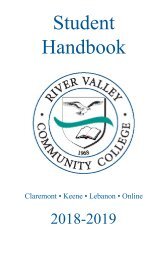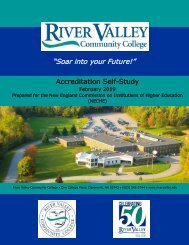You also want an ePaper? Increase the reach of your titles
YUMPU automatically turns print PDFs into web optimized ePapers that Google loves.
Scholarly expectations for faculty at <strong>RVCC</strong> are consistent with the mission and purpose of<br />
the College and are documented in SJDs along with faculty workload. Whenever a<br />
program requires that a faculty member hold specific licensure or certification in order to<br />
prepare students for the field of study, holding that credential is part of the job description<br />
and is evaluated prior to hiring. As part of the development of a faculty member’s<br />
workload each semester; the faculty member, Department Chair, and VPAA evaluate any<br />
scholarly pursuits that are categorized as non-instructional workload, and appropriate<br />
course release time is provided. Recently, examples of this type of work include <strong>RVCC</strong>’s<br />
co-requisite math project, committee work to develop course equivalency between CCSNH<br />
and the University System of NH, and preparation for individual program accreditation selfstudies.<br />
Program Directors and Department Chairs often have additional responsibilities as outlined<br />
in Article X of the Faculty CBA. The standard at River Valley is that the Program Director<br />
for each program is responsible for academic advising of any student in their program.<br />
There is also one full-time and one part-time advisor for General Studies and nonmatriculated<br />
students, and one part-time advisor for Liberal Arts students. In the case<br />
where a student may have multiple majors, direct communication between advisors is<br />
carried out to ensure that students are on track for both programs and can complete<br />
courses for both programs on an appropriate schedule.<br />
Currently, all advisors have access to each student’s unofficial transcript through the<br />
electronic Student Information System (SIS) and official transcripts via Banner or to<br />
student files held in the Registrar’s Office. This transcript allows advisors to see what<br />
courses and grades a student has taken and earned at any CCSNH institution, what<br />
courses the student has specifically taken or transferred in to River Valley, and what<br />
courses the student is currently enrolled in. In Fall of 2017, all programs were required to<br />
develop program maps. These maps are the pathway of courses, delineated by semester<br />
offered, that a student must take. Each Program Director uses these program maps when<br />
advising students and program maps for each program are housed in the <strong>RVCC</strong><br />
Communications folder available in Canvas so that any advisor can access any map and<br />
assist students who may be considering changing majors.<br />
Program Directors are encouraged to do graduation audits at least one semester before<br />
the student is scheduled to graduate. Graduation audits for each student are then<br />
performed by the Registrar in the spring of the student’s final year to ensure that students<br />
are on track to graduate. At the time of the graduation audit, Program Directors or<br />
advisors are notified of any discrepancies to allow time for additional advising or to<br />
transfer in any missing classes.<br />
Recruitment, Hiring, Compensation<br />
Job openings for faculty are done in a transparent and orderly fashion. The College’s hiring<br />
practices comply with federal equal employment opportunity guidelines and state<br />
nondiscrimination laws. Department Chairs work with the VPAA and Human Resources to<br />
advertise job openings, first throughout CCSNH (in house) for one week (as per current<br />
contract wording) and then to the wider community. There is a standard CCSNH-wide<br />
application form and process.<br />
82 | P a g e





